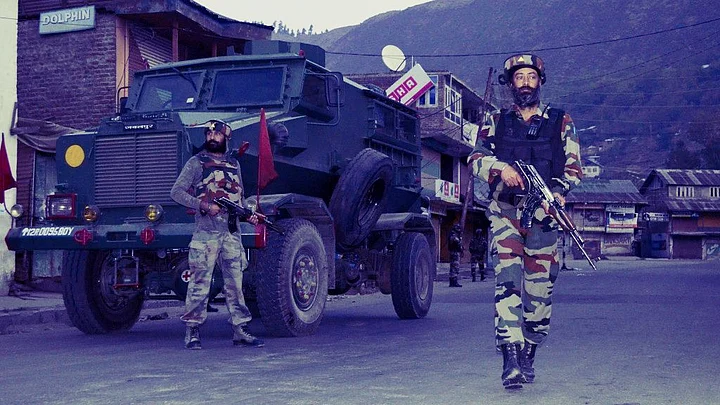Stating that “peace-building” would be “more my focus”, Lt Gen KJS Dhillon, the Corps Commander-designate of the Srinagar-based Chinar corps, said that he would open “all avenues” for local boys to surrender. He said a militant or a family member could approach a village sarpanch or the local administration, or a field unit of the army, even a bunker or post along the road.
Lt Gen Dhillon repeatedly asserted that he would make sure that any such “message will get to me”, and he would do everything to ensure a smooth surrender. Even after the run of successes by security forces against militants over the past seven months, the new commander hasn’t become complacent.
Curbing local militancy, preferably through surrenders, seems to be a bigger concern for Lt Gen KJS Dhillon, than the infiltration of Pakistanis which has recently been reported.
Concern for the Public
He also drew a clear distinction between militants and the rest of the population. “One who has picked up the gun has to die one day, unless he surrenders,” he said, but “the security (sic) environment has to be maintained.”
In this light, Dhillon emphasised the need for a “balanced and healthy approach” to the task of ensuring security, so that the “public is not hassled”. The primary objective was to ensure that people could go about their day-to-day activities without interference, he said.
He added that, while the district police had the task of dealing with crime, the army, the police and the para-military forces worked together as “a team, as one unit’ to ensure that the security of the environment was maintained.
‘Aim’ of Stone-Pelting
Asked how he viewed stone-pelting, Lt Gen KJS Dhillon said it could be seen as a way to express anguish, but was also used in Kashmir to ‘rescue’ terrorists and to disrupt the operations of the security forces. He held that those who did the latter were “paid pelters”.
Over the past four years, crowds have often come to the scenes of anti-militant operations to pelt stones at the forces engaged in these operations.
There were several disturbances and attacks around Republic Day 2019. Some security force camps were attacked, and stones were pelted at some locations.
Challenges Ahead for KJS Dhillon
Asked if the conduct of peaceful elections weighed heavily on him as he prepared to take charge of army operations in Kashmir, Dhillon replied that ensuring the conducting of peaceful elections is the main concern of any security force in a democracy.
There is intense speculation that polls to elect a new assembly for Jammu and Kashmir may be held along with the Lok Sabha polls, which in any case are to be held in the next three to four months.
Dhillon, who is likely to take charge some time in February, is going to Kashmir at a time when the most prominent militants have been killed, and recruitment of fresh boys to the militant ranks also appears to have reduced considerably since October. However, radicalisation among teenagers and children continues to be a worrying trend.
Meanwhile, infiltration of Pakistanis has continued over the past five years or so.
Even during this harsh winter, they have been slipping in, apparently across the international border south of Jammu.
Dhillon Brings With Him Years of Experience
Dhillon however, asserted that he was learning that “the anti-infiltration grid is very strong”. The numbers of foiled attempts and of infiltrators killed demonstrated this, he said, adding that this indicates excellent intelligence, and coordination between various agencies and forces.
He said he had spent the recent days since his appointment was announced, going over files and records, to bring himself up to date with the situation in Kashmir.
Dhillon brings to his new assignment many years of experience in Kashmir. He was a young captain and major in Panjgam Niara in the north from 1988 to 1990, and later served as a Rashtriya Rifles company commander in Lolab, also in the Kupwara district.
He served as a commanding officer at Gulmarg and in Tral, and later became the Brigadier General Staff (BGS) at the Corps headquarters in 2012-13. That will surely be valuable experience in his new assignment, since it is the BGS who coordinates the Corps’ day-to-day operations.
(The writer is a Kashmir-based author and journalist. He can be reached at @david_devadas. This is an opinion piece and the views expressed above are the author’s own. The Quint neither endorses nor is responsible for the same.)
(At The Quint, we question everything. Play an active role in shaping our journalism by becoming a member today.)
